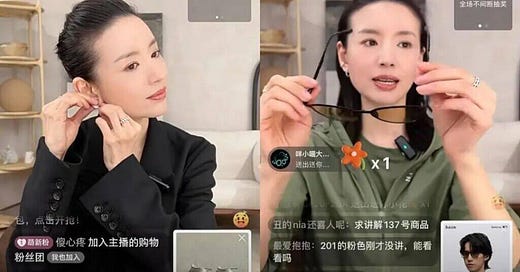Love, Money, or Utility: What Your Startup Really Needs to Give (According to Chinese Reality TV)
How a late-night Chinese reality TV binge turned into my new startup evaluation framework
Before you question my credentials as a VC, let me confess: I've been binge-watching "再见爱人" (Goodbye My Love) lately. In my defense, it's market research... for understanding human behavior... or something professionally justifiable like that. 🤷♀️
But here's the thing – there's this fascinating theory from the show about how successful relationships need to provide at least one of three core values: emotional value (情绪价值), economic value (经济价值), or functional value (功能性价值). And as I sat there, drinking my third boba of the day, it hit me – this isn't just about relationships. This is literally how successful businesses work too!
在看《再见爱人》的时候,忽然觉得这种理论不仅在感情关系中适用,在商业模式中同样有道理。一个成功的业务往往也要具备三大价值:情绪价值、经济价值和功能性价值。情绪价值让消费者对品牌产生共鸣,经济价值意味着产品带来的实际回报,而功能性价值则体现了产品的实用性和独特性。这就像在一段关系中,不仅要让对方开心,还得提供实际的支持和可靠的依靠。毕竟,客户和投资者就像伴侣一样,不只是被“概念”吸引,还要看到切实的价值。
The Emotional Value Play (Or Why We Can't Stop Watching Rich People Organize Their Closets)
Let's talk about emotional value first, because let's be honest, this is how I justify my YouTube Premium subscription. Think about all those influencers who literally just film themselves living their lives. They're not teaching you anything groundbreaking. They're not saving you money. But somehow, watching them organize their refrigerator at 2 AM feels like therapy.
Here's the deeper insight though – emotional value isn't just about entertainment; it's about identity and belonging. Take Li Ziqi for example. Are we really watching her videos to learn how to make furniture from bamboo? No, we're there for the aesthetic escapism and ASMR-level peace. She's selling emotional value better than my therapist (sorry, Dr. Chen). But what made her a phenomenon wasn't just the beautiful content – it was how she tapped into a collective yearning for a simpler, more traditional life amid our chaotic modern existence. This is why people will pay not just with their money but with their time and attention.
The real power move? When brands can turn emotional value into community belonging. Look at Lululemon – they're not just selling leggings; they're selling membership in a wellness-oriented lifestyle tribe. That's why people willingly become walking billboards for brands that make them feel part of something bigger.
The Economic Value Gang (Where Entertainment Meets Commerce)
Now, economic value is my Asian mom's love language, but it's evolved way beyond just coupon clipping. Let's talk about the phenomenon that's revolutionizing e-commerce: livestream shopping. In 2023, Chinese livestream shopping generated over $480 billion in revenues, with platforms like Douyin (TikTok's Chinese version) leading the charge.
Chinese livestreaming world continue to break records in astonishing ways. Take, for example, Dong Jie, who recently sold nearly $700 million worth of goods in just one 10-hour session. But it’s more than just impressive sales figures—it’s how she’s doing it. These streams are not just about slashing prices; they blend real-time interaction, entertainment, and curated deals, creating an immersive shopping experience that keeps viewers coming back. It’s a mix of hype and value that taps into both FOMO and the thrill of a good find, taking livestream shopping to a whole new level.
The genius part? The psychological satisfaction of scoring a deal often outweighs the actual savings. This is why Costco has us paying them to let us buy things, and why people will spend hours watching livestreams just to catch limited-time flash deals. We're not just buying products; we're buying the thrill of the hunt.
The Functional Value Heroes (The Ones That Actually Solve Problems)
Functional value might seem like the most straightforward of the three, but here's the plot twist – the most successful functional solutions often work because they understand the emotional barriers they're breaking down, not just the practical ones.
Take Duolingo for instance. Sure, it functionally teaches you languages, but its real genius is how it turned the frustrating process of language learning into a gamified experience with a passive-aggressive owl as your accountability partner. The functional value got you in the door, but the emotional engagement keeps you coming back.
Or look at how DoorDash evolved from pure functional value (food delivery) to include features like "DashPass" (economic value) and social sharing options (emotional value). The best functional solutions understand that solving a problem isn't enough – you need to solve it in a way that feels good and, ideally, saves money too.
My Takeaway (Or What Dating Shows Taught Me About VC)
As a VC, I've started looking at pitches through this lens. If a startup isn't providing at least one of these values strongly, it's probably going to struggle harder than my dating life. The best investments often start by dominating one value category and then expand to others.
The real secret sauce? Understanding how these values overlap and evolve. TikTok Shop isn't just combining entertainment with commerce; it's creating a new behavior pattern where shopping, socializing, and content consumption become inseparable. As VCs, we're not just betting on which value proposition is strongest today, but how it might expand to capture other value territories tomorrow.
P.S. Yes, I did just turn a Chinese dating show into a business framework. No, my Asian parents still aren't impressed that this is what I do with my MBA. Though they did finally download TikTok... to watch 李佳琦 sell lipsticks at 2AM.





